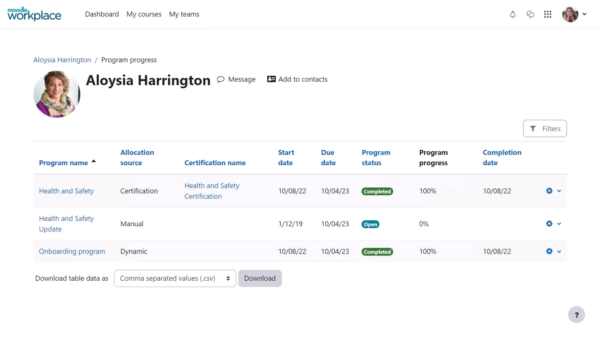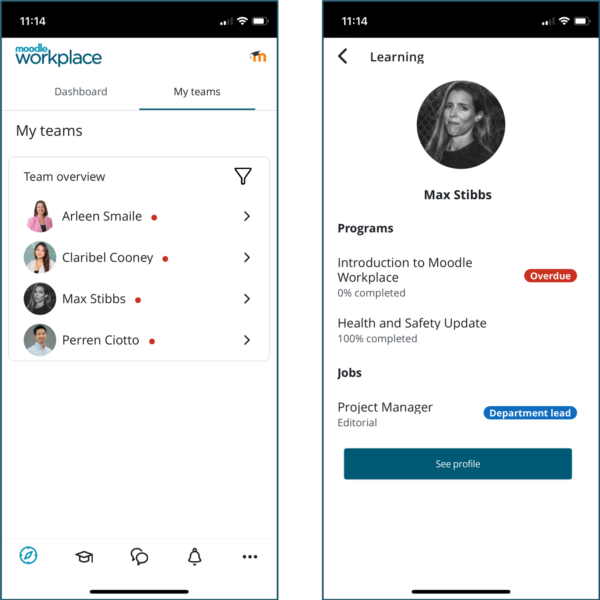With ongoing developments, such as the growth of AI, companies are witnessing firsthand both the necessity and advantages of a well-executed compliance training program.
To shed light on this, a report surveying over 350 practitioners from various industries in the United States, the European Union, and the United Kingdom highlights the challenges, such as limited resources and the anticipation of increased regulatory changes, that organisations face in meeting compliance standards. Compliance training becomes a crucial factor in addressing these challenges.
Moodle Workplace provides a comprehensive solution for compliance training by simplifying, automating, and tracking the training progress. In this article, we will explore the key challenges of compliance training in 2023 and explain how Moodle Workplace can help address the evolving needs in this area.
The key challenges of compliance training in 2023
Compliance training ensures organisational adherence to regulations and ethical standards. Compliance leaders face mounting pressure to optimise resources amidst economic uncertainties and increasingly complex workloads. The key trends that are shaping the compliance landscape in 2023 include budget constraints and shifts in workforce dynamics.
Budget constraints
Organisations are willing to allocate resources to adopt advanced compliance management systems, integrate innovative regulatory technology (RegTech) solutions, and leverage AI for more sophisticated risk assessment. This surge in technological investment is driven by the objectives of staying up-to-date with the evolving regulatory landscape and enhancing the overall efficiency of compliance processes.
However, limited funds may make it harder to improve training content and keep training materials updated with the latest compliance rules. According to the report, despite the initial optimism about an increase in the compliance budget in 2023, there is less hope for any significant increases. The number of respondents expecting the budget would increase has fallen over the last ten years, from 17% in 2013 to just 5% in 2023. In the United States, 57% of companies expected their compliance team budget to grow in the next 12 months, while in the UK and the EU, it is 48%.
To tackle this, organisations need smart strategies that focus on important aspects of compliance training while making the best use of the resources available.
Shift in workforce dynamics
It is estimated that between 2023 and 2027, certain industries and sectors will see a change of jobs among employees. A significant trend is the rapid growth of jobs related to AI and machine learning, sustainability, and business intelligence. As these roles become crucial in various industries, compliance training must adapt to educate employees on the ethical considerations, regulations, and standards associated with these emerging professions.
There is a decline in traditional roles such as data entry clerks, executive and administrative secretaries, accounting, bookkeeping, and payroll clerks. Compliance training programs should recognise this shift and streamline content to cater to the changing nature of job responsibilities and associated compliance responsibilities.
Efficient and systematic compliance training with Moodle Workplace
Moodle Workplace offers comprehensive solutions that simplify, automate, and help track progress in a compliance training process. Here’s how:
Certifications
Moodle helps organisations formalise their training modules into recognised certifications, ensuring that employees not only acquire knowledge but also gain official recognition for their compliance training achievements.
Certifications in Moodle Workplace are programs with a defined validity period. The first part of the program, known as the initial certification path, can be renewed through recertification, either using the same program or a different one. You can set up automated reminders for expiring certifications, reducing the manual burden of tracking and notifying employees about upcoming renewals. Dynamic rules simplify the process by automatically assigning users to certifications based on criteria such as job positions upon registration.
This ensures that compliance is not only achieved but consistently maintained, with timely reminders preventing lapses in certification.
After the initial certification expires, you have the option to establish a workflow for employee recertification. You can also monitor certification status based on the employee’s progress, indicated by whether they have completed the certification, they are running late, or if the certification date has expired.
Organisations can allocate employees to certifications using custom audiences, allowing them to align certifications with specific roles, departments, or compliance criteria. This level of customisation ensures that certifications are not one-size-fits-all but instead cater to the unique needs and requirements of different segments within the organisation.
Let’s consider an example of an organisation that requires its staff to be up-to-date with health and safety compliance training. All employees are required to be certified every year in order to do their job. To do this, the organisation can create a health and safety program on Moodle Workplace with all the mandatory training courses and a refresher program that only includes the most recent changes.
They can create the Health and Safety Certification by selecting the health and safety program as the initial certification path and the health and safety refresher as the re-certification path. Using Dynamic Rules, the organisation can create automation so all new employees are automatically allocated to the health and safety certification.
This way, when the certification is about to expire, the employees will be notified, and they will have an opportunity to take the refresher program and obtain an updated certificate.
Team overview
The Team overview block on Moodle Workplace allows managers to monitor and assess their employees’ learning and development progress, offering real-time insights and comprehensive reports on their team’s performance. Once you click on ‘My Teams’, you can check at a glance the progress of your learners.
Each user profile in the Team overview block showcases important details, including the profile picture, first name, last name, and last access information. To ensure timely management, a warning indicator alerts the manager if a program or certification is overdue. Once you expand a team member’s details, additional information and actions become available. This includes the status of all active certifications with a direct link to the progress report, the status of ongoing programs with a corresponding progress report link, comprehensive job details for all assignments, and convenient action buttons for sending a direct message or viewing the user’s profile. This way, managers can seamlessly oversee their team’s activities.
Workplace App
The Workplace App ensures that your team can complete their training anywhere, at any time, while prioritising their work. It is based on the Moodle App and contains all its functionality and some Workplace-specific elements.
The app facilitates access to Programs directly from the dashboard, where employees can easily navigate and engage with training courses. The Certification tool is integrated into the Programs feature, where employees can achieve certifications within the app, ensuring a streamlined process for completing and managing the courses.
The Workplace app also supports reporting functionalities. If required, a custom menu item can be added to provide employees with easy access to specific reports, giving them the chance to review their own performance.
Moodle Workplace not only aligns with the key trends in compliance but also provides optimised resources for comprehensive training purposes and seamlessly adapts to the shifting workforce structures and requirements.





